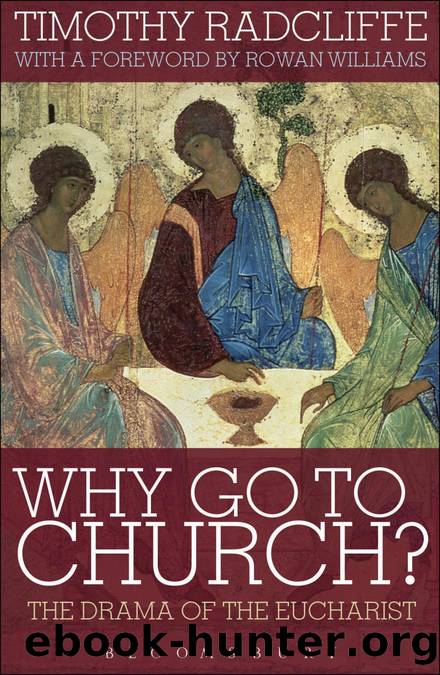Why Go to Church? by Radcliffe Timothy;Williams Dr. Rowan;

Author:Radcliffe, Timothy;Williams, Dr. Rowan;
Language: eng
Format: epub
Publisher: Bloomsbury Publishing Plc
Published: 2019-12-18T00:00:00+00:00
Act 2, Scene 3
âThe fruitful stones thunder roundâ
We begin the Eucharistic Prayer by invoking Godâs holiness, a holiness which is disclosed not in Godâs separation from all that is impure, sinful or touched by death, but in Jesus who overthrows boundaries, and embraces even death. But isnât there something disquieting about the spectacle of our priest, Jesus, being sacrificed upon the altar of the cross? Christians often speak of Christ as making satisfaction for our sins, but who was he satisfying? Would there not be something terrible about a God who demanded blood, the blood of his own Son? It appears to consecrate violence and place it at the heart of religion. All over the world religious fanatics are killing others and themselves in the name of God. The day that I write these words, the body of Paul Faraj Rahho, Chaldean Catholic Archbishop of Mosul, Iraq, has been found, another victim of religious hatred. Does not talk of blood poured out and of sacrifice seem to legitimate violent religion?
Some Christians hold theories of the atonement that do seem bloodthirsty. A common version goes like this: God in his mercy wished to save us, but his justice demanded an infinite sacrifice, and so his innocent Son must die so that the debt of our sins might be paid. One can see the logic, but it does not seem to be that of Jesus loving Abba. René Girard, more than anyone else, has opened up another way of seeing the sacrifice of Jesus â as a liberation from violence rather than its perpetuation. It was not God who demanded a victim; we did. This is not the place in which to explore Girardâs subtle and complex understanding of the death of Jesus1 but, if I may be forgiven a vast oversimplification, Girard claimed that every society finds its unity by alighting on scapegoats upon whom it loads its fear and hatred. Usually they are expelled and killed. We unite against victims whom we can join in hating. Societies define their identity by those whom they exclude and destroy. W. H. Auden wrote:
For without a cement of blood (it must be human,
it must be innocent) No secular wall can safely stand.2
This violence never finally achieves the communion we seek and so periodically it must be repeated or contained. One way in which all the societies of Jesusâ world did this was through the sacrifice of animals. Babylonians and Assyrians, Egyptians and Persians, Greeks, Romans, and, of course, the Jews had at the centre of their religions the massive slaughter of animals. One would have smelt the Temple in Jerusalem long before one saw it.
Jesusâ sacrifice upon the altar of the cross was not one more bloody example of this sacred violence but its defeat. He shows it up as empty and futile. âIt is impossible that the blood of bulls and goats should take away sinsâ (Hebrews 10.4). Jesusâ death was a massive rejection of a whole way of being religious. One
Download
This site does not store any files on its server. We only index and link to content provided by other sites. Please contact the content providers to delete copyright contents if any and email us, we'll remove relevant links or contents immediately.
| Clergy | Devotionals |
| Faith | Inspirational |
| Meditations | Monasticism & Asceticism |
| Prayer | Prayerbooks |
| Ritual | Sermons |
The Secret Power of Speaking God's Word by Joyce Meyer(3226)
More Language of Letting Go: 366 New Daily Meditations by Melody Beattie(3030)
The Holy Spirit by Billy Graham(2953)
To Light a Sacred Flame by Silver RavenWolf(2824)
Tuesdays With Morrie by Mitch Albom(2765)
The Lost Art of Good Conversation by Sakyong Mipham(2655)
The Traveler's Gift by Andy Andrews(2463)
Kundalini by Gopi Krishna(2185)
A Kingsbury Collection by Karen Kingsbury(2106)
Anxious for Nothing by Max Lucado(1977)
Angels of God: The Bible, the Church and the Heavenly Hosts by Mike Aquilina(1969)
Finding Chika by Mitch Albom(1968)
Angels by Billy Graham(1926)
As a Man Thinketh by James Allen(1904)
Curse Tablets and Binding Spells from the Ancient World by Gager John G.;(1863)
The Yoga of Jesus: Understanding the Hidden Teachings of the Gospels by Paramahansa Yogananda(1863)
Autobiography of a Yogi (Complete Edition) by Yogananda Paramahansa(1828)
Barking to the Choir by Gregory Boyle(1823)
How To Be Born Again by Billy Graham(1782)
